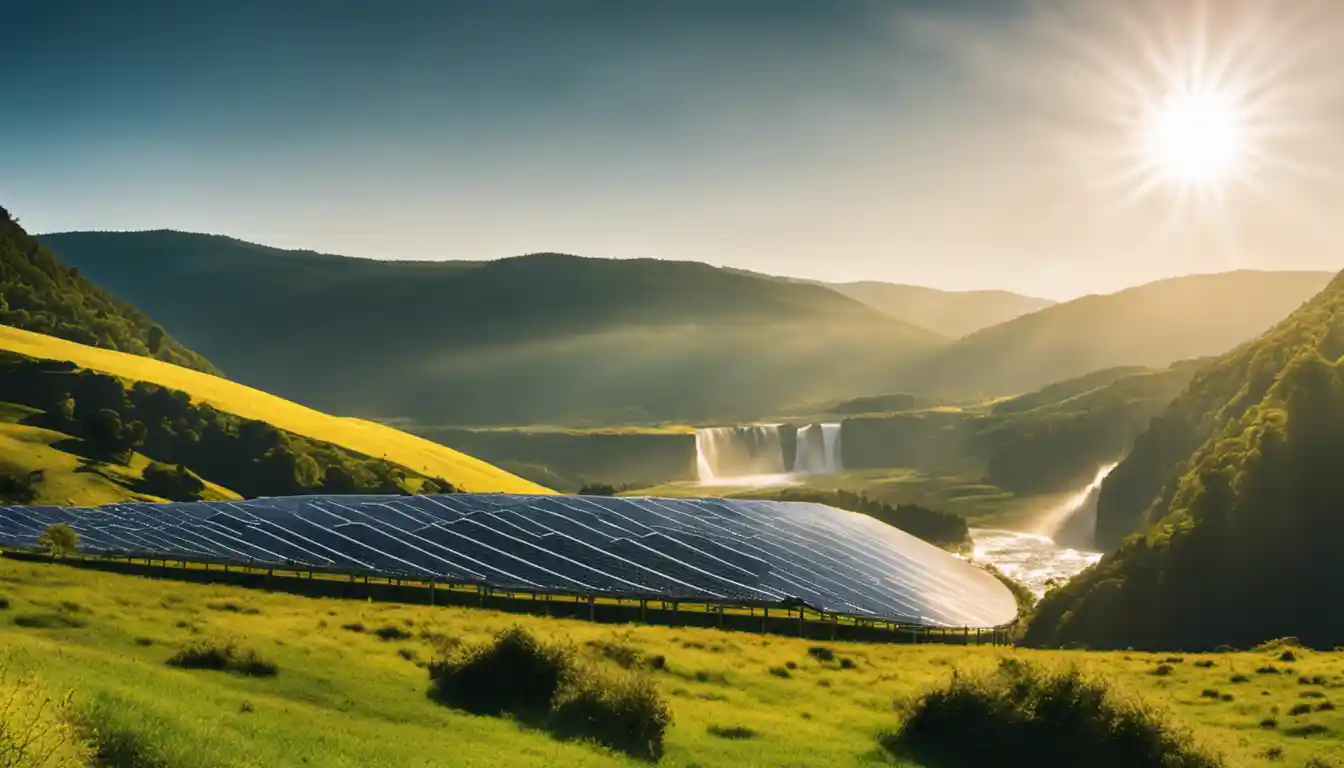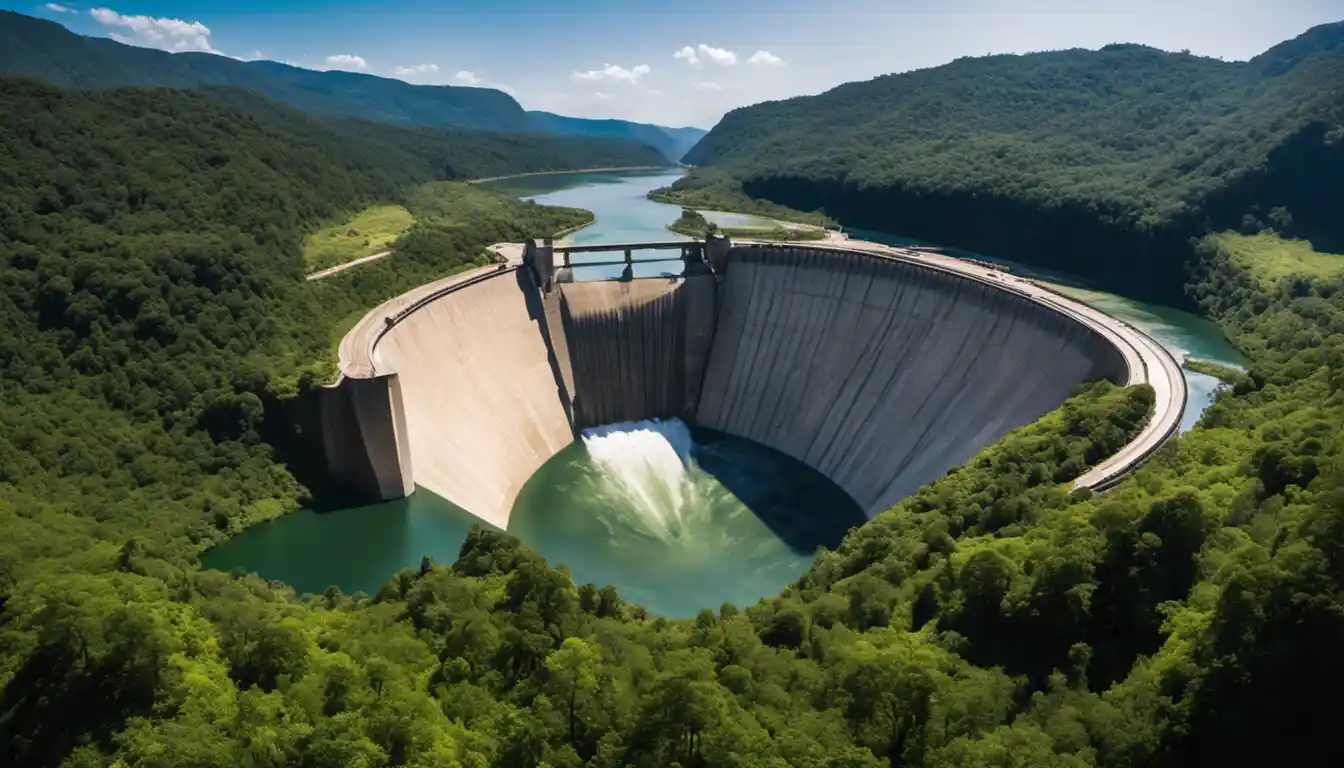Understanding Solar Power
Solar energy has several advantages over hydropower, including that it does not require a water source to produce energy, which makes it more accessible to different geographical locations. Additionally, solar panels have a less invasive impact on the natural environment compared to the infrastructure needed for hydropower systems such as dams. Solar power also has lower operational costs and higher scalability, enabling it to be used for small-scale applications like home energy systems.
Basics of Solar Energy
As we look at the hydropower vs solar power equation, we first need to delve into knowing exactly what solar power entails. Essentially, solar power involves direct conversion of sunlight into electricity. This process employs photovoltaic cells (PV Cells) that transform sunlight into electricity ready for use. What makes solar power so appealing is its incredible simplicity and the abundance of the raw material required, which is sunlight.
How Solar Energy is Generated
The beauty of solar energy is in its generation process. Unobtrusive solar panels collect sunlight which activates the PV cells. These cells then start an electric current of negatively-charged electrons forced into motion by the solar energy. The result is direct current (DC) power, which gets converted into alternating current (AC) power by an inverter. AC power is the type of electricity your home uses.
Understanding Hydropower
Before we aim to compare hydroelectric power with solar power, understanding hydropower is essential.
Basics of Hydropower
Hydropower involves the use of flowing or falling water to generate electricity. Call it the old powerhouse of renewable energy if you will – it’s one of the earliest forms of energy harnessed by humankind.
How Hydropower is Generated
Generating hydropower employs the use of a dam built across a river to reserve water. The stored water is then released to flow through turbines, turning them and activating the generator to produce electricity. The electric power is then transferred into the power grid.
Difference Between Solar Power and Hydropower

The prime way to differentiate the two is to consider the requirements for their respective processes.
Distinctions in Location Requirements
Let’s delve into why is hydropower better than solar power in some areas and vice versa. Hydropower requires a river with a sizeable flow, meaning it is location-dependent. In contrast, solar power is incredibly flexible, only requiring exposure to sunlight. You can install solar panels on roofs, in open fields, and even in remote desert areas.
Contrasts in Power Generation Processes
On the other hand, the power-generation process for hydropower is continuous. As long as there’s water flow, there’s power. However, solar power is reliant on sunlight, making it a daytime-only operation. But, thanks to the advancements in solar cell technology and battery storage, you can now store solar power to be used at night or during cloudy days.
Environmental Impact of Solar Power vs. Hydropower
Let’s examine the ecological footprint of solar and hydro power.
Ecological Footprint of Solar Power
Solar power’s advantages lie in its minimal environmental impact. Solar panels do not emit harmful pollutants once installed and functioning. Sure, there is an environmental cost during manufacture and transportation. Still, once these panels are in operative mode, they are a truly green source of power.
Ecological Footprint of Hydropower
Now, if we’re to compare hydroelectric power with solar power based on the ecological footprint, hydropower does have some downsides. Although clean during the energy generation phase, the dams used have a significant impact on the local environment. Building these dams disrupts local ecosystems, often displacing communities and entire species.
Comparing Solar Power and Hydropower

As we dive into comparative aspects, let’s weigh the pros and cons.
Pros and Cons of Solar Power
Advantages of Solar Power
Extremely reliable, solar power is easily scalable from powering a single device to an entire city. With the decreasing cost of PV cells, solar energy is now more affordable than ever. Plus, once your system is set and running, maintenance costs are minimal.
Disadvantages of Solar Power
However, solar power does have a few shortcomings. Its biggest challenge is weather dependency. In areas where sunlight is inconsistent, solar power may require backup power systems or storage batteries, which lead to additional expenses.
Pros and Cons of Hydropower
Advantages of Hydropower
In an ideal location, hydropower can be a reliable and continuous source of energy. The power supply is stable and can often be controlled to meet demand.
Disadvantages of Hydropower

Here’s where the tides turn (pun intended). Hydropower can have severe impacts on the environment. It can flood large areas, damaging ecosystems and displacing locals. Furthermore, dam-building projects often need much more initial capital compared to solar installations.
Is Solar Energy Better Than Hydroelectric?
Given the comparison between the two, the question remains – “is solar energy better than hydroelectric?” Let’s examine other essential factors:
Cost Considerations
Solar power comes out on top in terms of costs. With dropping costs of solar panels, the initial expenses are becoming more affordable. Also, the cost of operation and maintenance for solar power systems is generally less than hydropower.
Supply Stability
Although solar energy is largely dependent on the sun, advancements in battery storage solutions have begun to mitigate this weakness. On the other hand, hydropower is potentially unstable – a drought can severely impair energy generation.
Availability and Access
The ability to use solar energy in more diverse locations worldwide makes it a more accessible source. This versatility makes solar energy a key player in providing power to remote and off-grid locations.
Conclusion: Why Solar Energy is a Better Option than Hydropower
When we examine the advantages of solar energy over hydropower, the prognosis is clear: Solar power is the future of renewable energy. With continual technological advancements, lower costs, and minimal environmental impact, solar energy definitely takes the winning cup.
Check our guide to alternatives to solar panels for your home, for even more insight on other ways to harness the incredible power of the sun. As we steadily march into a future where sustainability is key, solar power is one ally we can count on.
And for those asking why is hydropower better than solar power, the answer might surprise you. Given the current scientific and technological landscape, it’s not anymore. Solar energy has taken the lead, offering us a bright and sustainable path forward.



